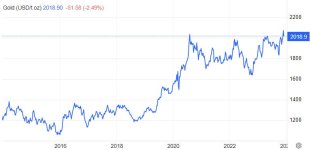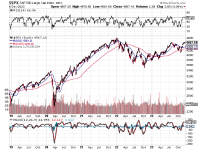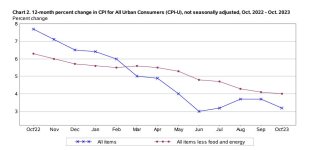"Spiraling Out Of Control": The U.S. Debt Crisis Goes Parabolic
Submitted by QTR's Fringe Finance
Over the weekend I had the pleasure of talking to my friend and favorite economist, Peter Schiff. Over the course of our exclusive hour-long conversation, I wanted to pick Peter’s brain about several key questions:
Here are all of the key points from our conversation.
Watching gold miner stocks lag gold over the last week, I wanted to ask Peter why he thought this gap existed, what it would take for miners to move higher, and whether or not this means the gold rally can’t be trusted.
Peter told me: “This, you know, one is—and this is kind of ironic—but inflation has actually really hurt gold mining companies. You would have thought, well, inflation is going to be good for gold miners because it's going to mean people are going to want to buy gold to hedge inflation. The gold price is going to go up, and so you would think that the miners would benefit from inflation. But what happened was inflation really pushed up the cost of mining, their raw material costs, you know, their energy cost, their labor costs.”
He continued: “It's an expensive procedure to mine gold, and the cost of mining kept going up and up. So even though the price of gold has gone up to $2,000, the mining companies are not that much more profitable than they were when gold was $1,000, because the costs have gone up commensurate. In fact, in many cases, the costs have gone up more than the price of gold. And so, that's been a problem.”

“But also, stocks are more of a reflection of investors' outlook for the future, and now you're trying to discount that future to the present. It's very forward-looking. So when investors are looking at a gold company and they see the price of gold at $2,000, they extrapolate what the profits are going to be over the next five or ten years,” Peter told me.
He concluded: “They have to make an assumption about where they think the price of gold is going to be over the next five or ten years to have any indication of what the profits are going to be. And if you look at the assumptions, they're generally for a lower gold price in the future than the price we have right now. So it's because the stock market investors are so bearish on the future of gold that they're not discounting a positive earnings impact of a rising gold price. Right? Whereas the gold price itself is just a reflection of what it costs to buy gold right now. What is the current supply and demand? What is the price? It's not what the price is going to be in a year or two or ten; it's what's the price right now. So it's kind of a different market. And to me, it's been a positive-negative indicator, a reverse contrarian indicator.”
 50% OFF FOR LIFE: For those that aren’t paid subscribers yet, you can take 50% off an annual plan: Get 50% off forever
50% OFF FOR LIFE: For those that aren’t paid subscribers yet, you can take 50% off an annual plan: Get 50% off forever
I also am baffled by the market’s moves of late — with a coming crack up boom and 20 years of toxic market sentiment and behavioral psychology the only reasons I can think of for a stock market moving higher at this valuation.
Peter told me: “The market's going up because the buyers are more motivated than the sellers. You know, and the prices are going up, but the buyers are operating under a lot of false assumptions that are going to come back to bite them. But my approach, and what I have been advising my clients, is not to try to figure out when the markets are going to reflect rational thinking. You know, just assume they stay irrational.”

He continued: “And if the Fed creates enough inflation, which they will, it is possible that we don't have a big drop in the stock market in nominal terms. I mean, I've always said that, and that's why my advice has not been to just stay short because the market's overvalued and is going to come down. Because if the dollar comes down more than the markets, then the markets don't go down, right, in dollars.”
He also told me he expects the markets to move near parity with gold: “I fully expect the Dow Jones to trade below two ounces of gold, maybe close to one. Now, right now, I mean, the Dow is what, 35,000? What is it, 36,000? Yeah, and gold is 2,000, so, you know, they're not even in the same ballpark right now. But if you look at previous major market bottoms, 1932 and 1980, the Dow was below 2 ounces of gold." And in fact, in 1980, it almost hit 1 ounce of gold, which was actually lower than the gold price of the Dow in 1932, following the 1929 stock market crash.”
(Chart of Dow Jones to Gold Ratio can be found here)
He concluded: “So, you know, to me, it doesn't matter what happens to the nominal price of the Dow. I'm not short, so it's irrelevant. What matters to me and my clients is the real value of the Dow, because that's what they own, right? And I think that's going to collapse. And so what I own, and what I've been advising people to own, are assets that will rise in real terms as the dollar falls. And so, I think my portfolio of dividend-paying foreign stocks, of resource stocks, of materials, and energy, mining, agriculture, the type of consumer companies that I own, and the products and services that they sell, and my heavy exposure to gold, and gold mining.”
“I think these portfolios are going to ultimately end up returning or giving the best real returns to investors, even if that may not have been the case the past 10 years.”
I also asked Peter to explain how and why he sees inflation being a problem, when to me I see there also being a strong case for deflation (money supply contracting, economy contracting).
Peter told me: “What's going to happen is the economic data is going to deteriorate more, including a meaningful rise in the official level of unemployment. The inflated GDP numbers are going to come back down, and the CPI is going to start to move up, rather substantially from its current levels. And so, what you're going to see is a situation where inflation is accelerating as the economy is decelerating.”

I asked: “Why is inflation going to move up as the money supply is contracting here, and as economic activity is going to start to contract? It seems like there's a case for deflation too, like a deflationary depression?”
Peter said: “This is going to be a depression, an inflationary depression, because the money supply has already grown so dramatically that even a small contraction is meaningless, given the expansion that it was preceded by.”
“The effects of inflation operate with a lag,” he continued. “So, you expand the money supply – that's the inflation – and then the consequences, prices go up. Now, sometimes asset prices could go up before consumer prices, but prices go up with a lag. And so, that's what happened, and so we still have a long way to go in as far as prices rising just to catch up to the inflation that we already created, even if we've backtracked a little bit by sucking out a small amount of the liquidity that was pumped in.”
Peter continued: “But what I think is going to happen is, as the economy weakens and as inflation rises, and as that higher inflation puts upward pressure on long-term interest rates, I believe the Fed is going to blink in this game of chicken and it's going to go back to quantitative easing in a big way. It may even try to cut rates a bit, we'll see. It won't get very far, but the Fed is going to pick stimulating the economy and propping up the banks and the government over fighting inflation.”
He concluded: “And then, it's going to be obvious that the Fed has basically surrendered and that inflation has won. And once that happens, that is the final nail in the dollar's coffin. The dollar can't be the reserve currency if it's going to be perpetually debased. And then, that's really going to accelerate the inflation because, as the dollar weakens because people doubt the Fed's resolve to fight inflation, or if the Fed is pretending that it's already won the fight when it hasn't, the weakening dollar is going to push commodity prices up rather substantially. And all that's going to bleed into the CPI. And then, as the economy weakens due to rising inflation and rising long-term interest rates, the budget deficits are going to explode.”
“That's going to be compounding the debt problem even more, causing the Fed to have to create even more inflation to monetize an even larger amount of debt. So, then it becomes a spiral and it risks runaway or even hyperinflation. So, I mean, we're on the cusp of this.”
Continue reading...
Submitted by QTR's Fringe Finance
Over the weekend I had the pleasure of talking to my friend and favorite economist, Peter Schiff. Over the course of our exclusive hour-long conversation, I wanted to pick Peter’s brain about several key questions:
Why gold miners are lagging the price of gold
Whether or not the stock market is going to move higher or lower
Why Peter thinks CPI could wind up moving higher yet again
Is there a case for deflation as well as inflation?
Does the forthcoming Bitcoin spot ETFs validate the crypto enough for him to get behind it yet?
Here are all of the key points from our conversation.
Why Gold Miners Are Lagging The Price Of Gold
Watching gold miner stocks lag gold over the last week, I wanted to ask Peter why he thought this gap existed, what it would take for miners to move higher, and whether or not this means the gold rally can’t be trusted.
Peter told me: “This, you know, one is—and this is kind of ironic—but inflation has actually really hurt gold mining companies. You would have thought, well, inflation is going to be good for gold miners because it's going to mean people are going to want to buy gold to hedge inflation. The gold price is going to go up, and so you would think that the miners would benefit from inflation. But what happened was inflation really pushed up the cost of mining, their raw material costs, you know, their energy cost, their labor costs.”
He continued: “It's an expensive procedure to mine gold, and the cost of mining kept going up and up. So even though the price of gold has gone up to $2,000, the mining companies are not that much more profitable than they were when gold was $1,000, because the costs have gone up commensurate. In fact, in many cases, the costs have gone up more than the price of gold. And so, that's been a problem.”

“But also, stocks are more of a reflection of investors' outlook for the future, and now you're trying to discount that future to the present. It's very forward-looking. So when investors are looking at a gold company and they see the price of gold at $2,000, they extrapolate what the profits are going to be over the next five or ten years,” Peter told me.
He concluded: “They have to make an assumption about where they think the price of gold is going to be over the next five or ten years to have any indication of what the profits are going to be. And if you look at the assumptions, they're generally for a lower gold price in the future than the price we have right now. So it's because the stock market investors are so bearish on the future of gold that they're not discounting a positive earnings impact of a rising gold price. Right? Whereas the gold price itself is just a reflection of what it costs to buy gold right now. What is the current supply and demand? What is the price? It's not what the price is going to be in a year or two or ten; it's what's the price right now. So it's kind of a different market. And to me, it's been a positive-negative indicator, a reverse contrarian indicator.”
Why Are Stocks Still Moving Higher Despite Ugly Economic Data Incoming?
I also am baffled by the market’s moves of late — with a coming crack up boom and 20 years of toxic market sentiment and behavioral psychology the only reasons I can think of for a stock market moving higher at this valuation.
Peter told me: “The market's going up because the buyers are more motivated than the sellers. You know, and the prices are going up, but the buyers are operating under a lot of false assumptions that are going to come back to bite them. But my approach, and what I have been advising my clients, is not to try to figure out when the markets are going to reflect rational thinking. You know, just assume they stay irrational.”

He continued: “And if the Fed creates enough inflation, which they will, it is possible that we don't have a big drop in the stock market in nominal terms. I mean, I've always said that, and that's why my advice has not been to just stay short because the market's overvalued and is going to come down. Because if the dollar comes down more than the markets, then the markets don't go down, right, in dollars.”
He also told me he expects the markets to move near parity with gold: “I fully expect the Dow Jones to trade below two ounces of gold, maybe close to one. Now, right now, I mean, the Dow is what, 35,000? What is it, 36,000? Yeah, and gold is 2,000, so, you know, they're not even in the same ballpark right now. But if you look at previous major market bottoms, 1932 and 1980, the Dow was below 2 ounces of gold." And in fact, in 1980, it almost hit 1 ounce of gold, which was actually lower than the gold price of the Dow in 1932, following the 1929 stock market crash.”
(Chart of Dow Jones to Gold Ratio can be found here)
He concluded: “So, you know, to me, it doesn't matter what happens to the nominal price of the Dow. I'm not short, so it's irrelevant. What matters to me and my clients is the real value of the Dow, because that's what they own, right? And I think that's going to collapse. And so what I own, and what I've been advising people to own, are assets that will rise in real terms as the dollar falls. And so, I think my portfolio of dividend-paying foreign stocks, of resource stocks, of materials, and energy, mining, agriculture, the type of consumer companies that I own, and the products and services that they sell, and my heavy exposure to gold, and gold mining.”
“I think these portfolios are going to ultimately end up returning or giving the best real returns to investors, even if that may not have been the case the past 10 years.”
CPI Is Going Higher
I also asked Peter to explain how and why he sees inflation being a problem, when to me I see there also being a strong case for deflation (money supply contracting, economy contracting).
Peter told me: “What's going to happen is the economic data is going to deteriorate more, including a meaningful rise in the official level of unemployment. The inflated GDP numbers are going to come back down, and the CPI is going to start to move up, rather substantially from its current levels. And so, what you're going to see is a situation where inflation is accelerating as the economy is decelerating.”

I asked: “Why is inflation going to move up as the money supply is contracting here, and as economic activity is going to start to contract? It seems like there's a case for deflation too, like a deflationary depression?”
Peter said: “This is going to be a depression, an inflationary depression, because the money supply has already grown so dramatically that even a small contraction is meaningless, given the expansion that it was preceded by.”
“The effects of inflation operate with a lag,” he continued. “So, you expand the money supply – that's the inflation – and then the consequences, prices go up. Now, sometimes asset prices could go up before consumer prices, but prices go up with a lag. And so, that's what happened, and so we still have a long way to go in as far as prices rising just to catch up to the inflation that we already created, even if we've backtracked a little bit by sucking out a small amount of the liquidity that was pumped in.”
Peter continued: “But what I think is going to happen is, as the economy weakens and as inflation rises, and as that higher inflation puts upward pressure on long-term interest rates, I believe the Fed is going to blink in this game of chicken and it's going to go back to quantitative easing in a big way. It may even try to cut rates a bit, we'll see. It won't get very far, but the Fed is going to pick stimulating the economy and propping up the banks and the government over fighting inflation.”
He concluded: “And then, it's going to be obvious that the Fed has basically surrendered and that inflation has won. And once that happens, that is the final nail in the dollar's coffin. The dollar can't be the reserve currency if it's going to be perpetually debased. And then, that's really going to accelerate the inflation because, as the dollar weakens because people doubt the Fed's resolve to fight inflation, or if the Fed is pretending that it's already won the fight when it hasn't, the weakening dollar is going to push commodity prices up rather substantially. And all that's going to bleed into the CPI. And then, as the economy weakens due to rising inflation and rising long-term interest rates, the budget deficits are going to explode.”
“That's going to be compounding the debt problem even more, causing the Fed to have to create even more inflation to monetize an even larger amount of debt. So, then it becomes a spiral and it risks runaway or even hyperinflation. So, I mean, we're on the cusp of this.”
Continue reading...

